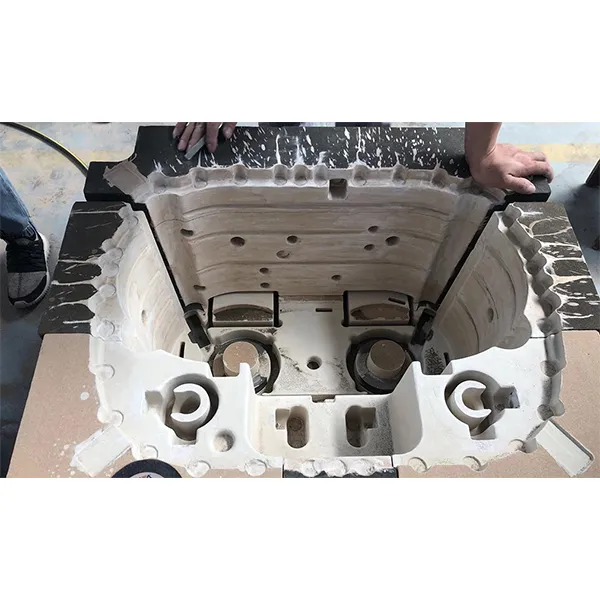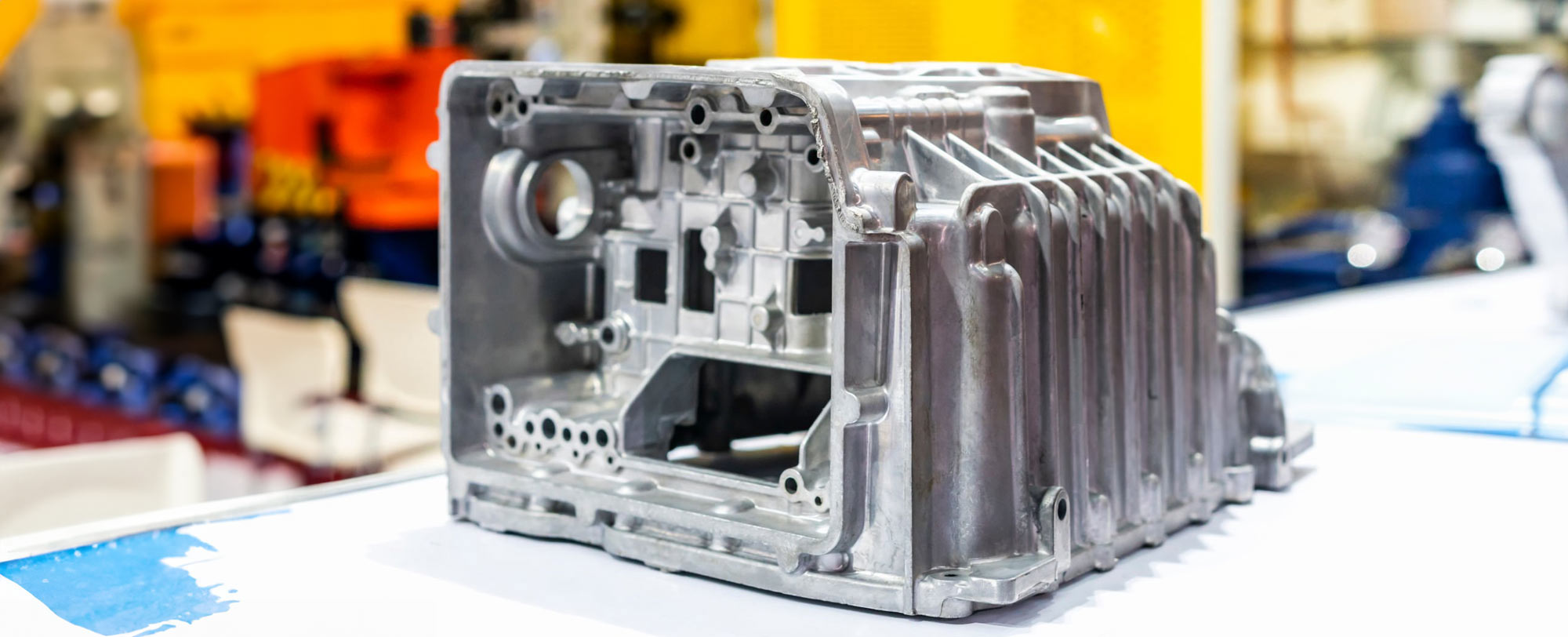Checking Out the Cutting-edge Procedures Behind Modern Light Weight Aluminum Shop Procedures
Modern aluminum foundry procedures are undertaking considerable makeover. Automation and AI are improving manufacturing approaches, improving both performance and precision. The combination of 3D printing is improving mold production, while sustainability methods are coming to be a lot more essential. Each of these innovations plays a key duty in redefining the sector. The ramifications of these adjustments expand past mere manufacturing effectiveness. What chances and obstacles exist ahead for aluminum factories in this evolving landscape?
The Function of Automation in Light Weight Aluminum Foundries

Additionally, automation adds to enhanced security standards within the foundry atmosphere. By moving harmful jobs to machines, human employees can concentrate on managerial duties and quality assurance, lessening the threat of mishaps. Furthermore, data analytics stemmed from automated processes provide valuable understandings into operational efficiency, leading to much better decision-making and constant renovation. As the need for aluminum products grows, the adoption of automation innovations will likely broaden, additionally changing the landscape of aluminum factory operations.
Improvements in Spreading Technologies
Recent advancements in casting modern technologies are transforming aluminum shop procedures. Innovations such as 3D printing combination, progressed alloy formulations, and automated process optimization are improving performance and item high quality. These advancements are crucial in fulfilling the progressing demands of the market.
3D Printing Assimilation
Integrating 3D printing technology into aluminum shop operations has actually changed typical casting methods, improving both efficiency and precision. This innovative method permits the quick production of complex mold and mildews and cores, significantly decreasing lead times and material waste. By making use of additive production, foundries can produce intricate geometries that were impossible or formerly difficult to accomplish with traditional strategies. The versatility of 3D printing also allows fast style alterations, promoting an extra dexterous production process. Furthermore, this assimilation sustains the usage of light-weight frameworks, which is progressively crucial in industries such as auto and aerospace. As light weight aluminum factories remain to embrace 3D printing, they place themselves at the center of technological advancement, driving improvements in product quality and operational abilities.
Advanced Alloy Formulations
The growth of advanced alloy formulations has considerably boosted casting modern technologies in light weight aluminum factory operations. These formulations integrate different elements, such as copper, magnesium, and silicon, to enhance mechanical properties and thermal resistance. By tailoring the composition of light weight aluminum alloys, makers can accomplish certain performance characteristics that fulfill the needs of varied applications, from auto elements to aerospace frameworks. Making use of sophisticated alloys additionally adds to reduced weight and increased stamina, which are critical consider modern-day design. Furthermore, developments in alloy advancement make it possible for far better fluidity during spreading, leading to improved surface area coatings and reduced issues. Overall, advanced alloy formulas stand for a significant jump onward, positioning light weight aluminum shops to meet the advancing demands of different industries efficiently.
Automated Process Optimization
Advancements in casting technologies have actually paved the means for computerized procedure improvement in light weight aluminum shop procedures. By incorporating innovative software and real-time data analytics, foundries can now enhance production processes and boost quality assurance. Automated systems keep track of variables such as stress, temperature, and cooling rates, enabling immediate changes that minimize problems and waste. In addition, artificial intelligence algorithms analyze historical efficiency information to anticipate suitable setups, thereby boosting performance and lowering cycle times. Robotics likewise play a considerable function, taking care of repetitive tasks that boost safety and precision. On the whole, these advancements not just drive operational effectiveness however likewise make it possible for shops to meet the growing need for top quality aluminum parts in different industries.
Smart Production and Industry 4.0 Assimilation
The integration of Smart Production and Industry 4.0 within light weight aluminum foundries is transforming operational performance. By leveraging IoT modern technologies, automation, and robotics, factories can optimize production processes and minimize downtime. Additionally, information analytics provides vital insights that enhance decision-making and drive continual enhancement.
IoT in Shop Procedures
As suppliers progressively accept the Internet of Things (IoT), shop operations are experiencing a transformative change towards clever production and Industry 4.0 combination. Precision aluminum casting. IoT technologies enable real-time information collection and analysis, improving decision-making procedures and functional performance. Sensors and linked tools check devices efficiency, material usage, and environmental problems, allowing for aggressive upkeep and source optimization. This connectivity promotes an extra active production atmosphere, where adjustments can be made promptly in feedback to market demands. In addition, IoT helps with boosted traceability and quality assurance, as information from the whole production cycle can be conveniently accessed and analyzed. Overall, the integration of IoT in factory operations considerably improves productivity and drives advancement in light weight aluminum manufacturing processes
Automation and Robotics Combination
Automation and robotics assimilation is transforming aluminum factory operations by boosting performance and accuracy. This transformative strategy enhances procedures such as molding, putting, and ending up, decreasing human mistake and enhancing result consistency. By utilizing sophisticated robotic systems, shops can attain greater manufacturing prices while keeping strict top quality criteria. Automated systems likewise enable real-time monitoring and flexible control, enabling speedy adjustments to manufacturing criteria. Furthermore, the assimilation of robotics minimizes labor prices and reduces safety and security dangers related to hands-on handling of liquified steel. As factories embrace smart manufacturing principles intrinsic in Market 4.0, the harmony in between automation and robotics solidifies their one-upmanship, leading the way for sustainable development and development in the aluminum casting industry.
Data Analytics for Efficiency
Taking advantage of information analytics substantially enhances effectiveness within aluminum foundry procedures, straightening with clever manufacturing and Market 4.0 principles. By leveraging real-time data collection and evaluation, foundries can keep track of production processes, anticipate tools failures, and enhance source allowance. This data-driven method helps with insightful decision-making, making it possible for managers to determine bottlenecks and improve workflow. In addition, predictive analytics empowers foundries to prepare for market demands, thus decreasing waste and making certain timely product delivery. Integration of information analytics with IoT tools boosts operational presence, promoting a positive upkeep society. Ultimately, implementing these sophisticated logical methods not only improves performance yet also drives advancement, positioning aluminum factories to fulfill the progressing needs of the market while keeping one-upmanships in a swiftly transforming landscape.
Lasting Practices in Aluminum Spreading
While the light weight aluminum spreading sector has traditionally faced ecological difficulties, lots of shops are currently adopting lasting practices to mitigate their influence (Precision aluminum casting). A significant focus has gotten on recycling aluminum scrap, which not only reduces waste but also saves energy contrasted to key aluminum manufacturing. Innovative melting technologies, such as induction heaters, boost power performance and reduced greenhouse gas discharges
In addition, factories are applying closed-loop water supply to lessen water usage and lower thermal air here are the findings pollution. Using environment-friendly binders in mold-making processes is getting grip, more reducing dangerous exhausts.
Some centers are investing in sustainable energy sources to power procedures, lining up with global sustainability objectives. By integrating these practices, the aluminum spreading industry is developing towards a much more ecologically liable future, demonstrating that financial development can coexist with environmental stewardship - Precision aluminum casting. These initiatives mirror a dedication to sustainability and the importance of ecological responsibility in manufacturing
Quality Control Innovations
As the light weight aluminum casting sector developments in the direction of sustainability, the importance of top quality control technologies ends up being increasingly obvious. Modern aluminum factories are embracing innovative technologies to improve their quality control processes. Strategies such as real-time surveillance and data analytics enable producers to find disparities and defects early in the production cycle. Implementing automatic examination systems furnished with maker learning algorithms warranties that products meet strict quality criteria while reducing human error.
The combination of non-destructive testing methods, such as ultrasonic and radiographic evaluations, supplies deeper understandings right into the integrity of castings without damaging the product. These developments not only enhance product reliability however likewise decrease waste, straightening with sustainability goals. On top of that, the fostering of standardized top quality frameworks aids streamline operations across various foundries, guaranteeing consistency in output. Jointly, these innovations are reshaping top quality control, promoting a culture of quality within the aluminum casting sector.
Future Fads in Light Weight Aluminum Factory Procedures
What advancements lie in advance for aluminum factory procedures? The future of light weight aluminum shops is positioned for transformation via innovations in automation, fabricated intelligence, and sustainable practices. The combination of robotics and automated systems is expected to enhance efficiency and precision in the spreading processes, minimizing human error and labor prices. Furthermore, AI-driven analytics will make it possible for real-time tracking and predictive maintenance, optimizing functional efficiency and lessening downtime.
Sustainability continues to be a centerpiece, with factories significantly embracing eco-friendly practices, such as utilizing recycled light weight aluminum and creating low-emission melting innovations. Innovations in 3D printing are likewise prepared for to revolutionize mold-making, permitting intricate geometries and reduced product waste. As the industry embraces digitalization, data-driven decision-making will end up being essential, allowing foundries to react promptly to market demands. Collectively, these patterns guarantee to redefine aluminum factory procedures, making them extra effective, sustainable, and versatile to future difficulties.

Frequently Asked Questions
What Precaution Are Carried Out in Aluminum Shop Workflow?
Aluminum factory procedures implement various security measures, including individual protective devices, air flow systems to manage fumes, routine safety and security training, emergency response strategies, and stringent monitoring of temperature and equipment to avoid accidents and warranty worker safety.
How Do Factories Handle Labor Force Training for New Technologies?

What Products Are Generally Recycled in Aluminum Foundries?
Aluminum factories frequently reuse scrap get redirected here aluminum, consisting of post-consumer products like drink containers, this website automotive parts, and building and construction materials. This recycling process lowers waste and conserves resources, adding to a much more lasting aluminum manufacturing market.
Exactly How Does Aluminum Spreading Impact the Environment?
Aluminum casting effects the environment via energy-intensive processes, greenhouse gas discharges, and potential local contamination. Nonetheless, improvements in recycling and sustainable practices can alleviate these results, promoting a much more environmentally friendly approach to light weight aluminum production.
What Are the Common Lead Times for Light Weight Aluminum Spreading Projects?
Typical preparation for aluminum casting tasks vary substantially, normally ranging from 2 to six weeks. Factors influencing these timelines include complexity, order size, and material availability, affecting total production routines in foundry procedures.
Automation progressively plays an essential duty in light weight aluminum shops, boosting efficiency and precision in the production procedure. Innovations in casting technologies have actually led the means for automatic procedure enhancement in light weight aluminum factory operations. Utilizing information analytics significantly improves effectiveness within aluminum shop operations, straightening with wise manufacturing and Industry 4.0 principles. A considerable emphasis has been on recycling light weight aluminum scrap, which not only lowers waste yet additionally saves energy compared to primary aluminum manufacturing. Aluminum factories commonly recycle scrap light weight aluminum, including post-consumer products like beverage cans, automobile components, and construction materials.